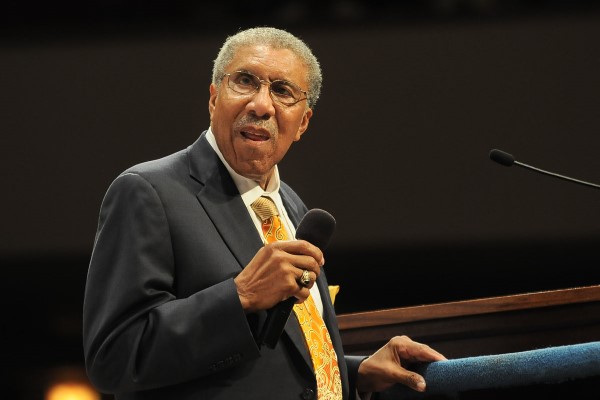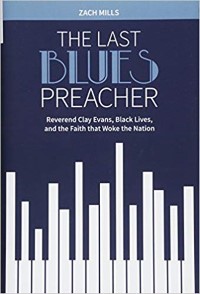
The Rev. Clay Evans
Music, spirituality and civil rights converge in the biography of Chicago legend Clay Evans, written by Murfreesboro resident Zach Mills.
The book, titled The Last Blues Preacher and telling Evans’ story, was released in May 2018 by Fortress Press.
Evans was born in Brownsville, Tennessee, and is known as the “godfather of Chicago’s black preachers.” He founded Fellowship Missionary Baptist Church in Chicago in 1958 and worked with prominent civil rights activist Jesse Jackson Sr. to advance the civil rights movement in the city. Together, they founded Operation PUSH, which worked to advance the economic situation of African Americans in the area. Evans was also a singer and songwriter, releasing several albums that made the gospel charts in the ’80s and ’90s.
Evans was born into a sharecropping family in Tennessee, and, according to Mills, describes that time in his life as “slavery.”
“When they would be out in the field, working all day, they would sing,” Mills said. “Music for them, was a great release. . . . Music played a really great role in expressing a lot of emotions.”
Mills was approached by two friends of Evans at Hyde Park Union Church in Chicago after a service about eight years ago and was asked if he would be interested in writing Evans’ biography. From there, Mills set a meeting with Evans and decided to pursue the story.
“It was kind of serendipitous because a few years before I moved to Chicago, I was a graduate student at Vanderbilt, and I needed money to finish the degree. They sent me to do research in a little area called Brownsville, Tennessee, which happens to be [Evans’] hometown.”
Once Mills began to hear more about who Evans was, he became more excited about sharing his story.
“He was one of the few people who stood with Dr. King, when lots of people, including black pastors, didn’t want Dr. King in Chicago starting a movement in 1966. So, when I heard these stories, I said, ‘My goodness, this sounds like a really great project to be a part of.’”
Mills said that he also felt drawn to the project at a spiritual level.
“There’s this feeling that God and the universe were bringing us together to tell this story,” Mills said. “The nation is kind of polarized, racially and politically. So, as we started this story, it did feel like the universe was saying, ‘You guys need to tell this story because a lot of people need to hear it.’”

Mills began interviewing Evans once a week for a couple of hours in 2011 and conducted research in libraries, leafing through books and ’60s publications from Chicago.
“I had some background in journalism, but I had no experience writing a biography,” Mills said. “So, the whole project was intimidating. And talking to [Evans], who worked with Dr. King and mentored Jesse Jackson . . . was incredibly intimidating, but he was incredibly humble. He always made me feel at ease.”
Mills said that Evans noticed his fears and told the writer that he should be concerned but not worried.
“He said, ‘If you’re concerned, that means you’re going to take this project seriously, but don’t be worried, because whatever you do, I’ll be pleased with. Full speed ahead.’”
Mills eventually overcame his fears and indeed moved full speed ahead, completing the book in 2018.
He said the response has been overwhelmingly positive.
“Everybody who has read the book has said the same thing,” Mills said. “They appreciate it being a underdog story. Reverend Clay wasn’t a good student in school. He got bullied by pastors after he started working with Dr. King. It’s the theme of the underdog that people really have enjoyed.”
Mills is currently a public speaking instructor at Daymar College in Murfreesboro.
Find The Last Blues Preacher on fortresspress.com or barnesandnoble.com.













